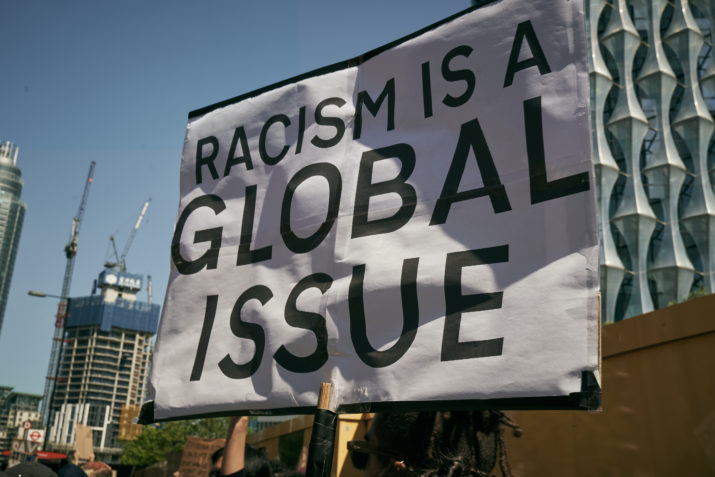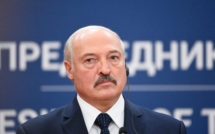

In discussing race in America, author James Baldwin suggested that “God gave Noah the rainbow sign, no more water, the fire next time.”[1] While speaking of the failure of America to answer for horrors of slavery and discrimination towards African Americans, the suggestion could also be made that Europe faces a reckoning of its own, given its own history concerning race. Each semester, my responsibility as a professor of international relations is, for lack of a better phrase, to introduce the world beyond the headlines to my students. The hope is that students will appreciate the complexities of nations as their respective civil societies are faced with new challenges in the twenty-first century. If introduced to students effectively, issues of race and ethnicity can enhance critical thinking. Moreover, in a year that has seen millions of lives impacted by the Coronavirus, understanding how race has impacted efforts to introduce Europe to the classroom has been a fascinating and enterprising experience. Last semester, my task was to help students “discover” Europe in a way that went beyond the traditional classroom experience―to understand the complexities and dynamics of this ever-evolving part of the world.
Keeping in mind that, as a subject, international relations and its voluminous histories concerning Europe cannot possibly be understood within a sixteen-week semester, flexibility was required on my part. Despite my ambitions and audacities, recognizing my limitations has served me well in this regard. For example, one of the questions I ask each semester, is how to determine what historical events to emphasize from a theoretical perspective. In the past, I have introduced Fernand Braudel’s “longue durée,” which focuses on the structural changes within historical time. This has allowed students to see history as a cyclical concept to which events in the past can be understood in a contemporary sense. An emphasis on Portuguese and Spanish hegemony in the fifteenth century can in some cases allow students to understand modern day examples of unipolar or bi-polar examples of spheres of influence. However, that is only one aspect of European history, which is limited in scope because of a focus on macro themes as opposed to a focus on each European nation impacted by hegemonic states.
Secondly, and this is also important to emphasize, I am a professor at an American Historically Black College & University (HBCU), which historically has not emphasized Europe as an area of geocultural or geopolitical interest. There are several reasons for this. In their well-received work, Racial Formation in the United States, Michael Omi and Howard Winant argue that race is a master category, a kind of template for patterns of inequality, marginalization, and difference throughout US history.[2] Consequently, Europe has historically been viewed by African Americans as an extension of the belief that there is a systemic American racial construct, albeit due to its own colonial and perceived neo-colonial endeavors in both Africa and other parts of the Black Diaspora. In part defined by a sense of cultural and psychological connection to the African continent, the Black Diaspora represents black people not physically living in Africa but who still define themselves as African, despite their dispersal as a result of the transatlantic slave trade to the Americas and Europe. In some respect, these circumstances, as an area of intellectual curiosity, caused European studies at my university to be limited in scope as a primary area of comparative political study. I would argue that this is due, in part, to the belief that Europe is seen to perpetuate a sense of cultural alienation towards black people similar to that America has historically represented. While this may not necessarily be true, this belief has served to construct a general sense for African Americans and perhaps European blacks that they are the ”Other,” defined in part as a binary means to separate Europeans as whites from those of Europe and America who are not.[3]
Consequently, my objective during the fall semester was to teach about Europe in a more comprehensive manner, while also realizing the need to establish historical themes of primary focus. First, my aim was to encourage students to appreciate the historical and contemporary challenges faced by Europe as the continent comes to grips with its historical/racial past while also facing contemporary challenges as to the conceptualization of European identity. This is especially the case concerning the perpetual challenge posed by immigration from Africa, and points beyond in regards to the cultural meaning of Europe as an entity based on the idea of the nation state in the twenty-first century. Secondly, I wanted students to discover that, despite their relative unfamiliarity, learning about Europe could prove to be a worthwhile enterprise for the purpose of broadening their own global perspectives. This would require me to reassess many of my teaching methods of the past, given that the entirety of the semester would now be taught virtually due to COVID-19. From this circumstance, I have gained a deeper understanding and appreciation for the need to adapt in order to maximize the instructor-student educational relationship. While certainly no one can predict how the Coronavirus will change the classroom going forward, I have found that being creative as an instructor and understanding the necessity of streamlining information by maximizing the tools of virtual learning can enhance students’ potential for learning.
In his seminal work “The Practice of Conceptual History: Timing History, Spacing Concepts,” German philosopher Reinhart Koselleck discusses how both historical and ahistorical concepts shape our perception.[4] More particularly, much of Koselleck’s text seeks to discover the subjective nature of historicity itself through the need to periodize its meaning. According to Koselleck:
Such historical relativism, if well thought through, seems to lead to the functional method…This method excludes infinite regress.[5]
Indeed, each semester presents this challenge of balancing out the largess of macro-history with the specificity of micro-history in a way that creates a means for students to comprehend content regardless of their respective degrees of familiarity, within a framework of contemporary knowledge.
The vast majority of my students are African American and the prism of race has served as a significant factor in regards to how they perceive the international world as well as occurrences within the United States. To provide additional context, David Macey in his biography on Frantz Fanon discusses Fanon’s perspective on race, where he asserts that blackness is particularized but not trans-historical “fact.”[6] As a concept, blackness is, in part, defined by its conception within the relative historical moment, and is forever based in part on how it is subjectively experienced. Therefore, because it is subjective and dependent on history, blackness is not an ontological concept. Perhaps no recent moment symbolized this subjective experience of race more so than the death of George Floyd, which reverberated not just in the United States but across Western and Eastern European cultural and political landscapes as well. While the 4,442 miles that separate Europe and Minnesota where Mr. Floyd lost his life on May 20, 2020 seem significant, events across the European continent suggest that Europe too must meet its own challenges in regards to race. I saw this as a teaching opportunity in terms of how race continues to impact the foundations of civil society in both the United States and across the Atlantic. For instance, in the city of Bristol, located in Southwest England, the statue of Edward Colston―a seventeenth-century slave holder―was toppled down soon after the event in Minnesota. Similarly, a statue of Winston Churchill was the target of protestors who took issue with the consequences of the historical notion that the “sun would never set” upon the British Empire. Finally, in Belgium, monuments devoted to King Leopold were defaced in part due to the historical role that country played in the brutal colonization of the Congo. For some Belgians however, the refusal by their government to acknowledge Leopold’s historical role in Belgium’s imperialist project is seen as perpetual racial complicity.
A diaspora is not defined by proximity, nor does it always lead to perpetual cynicism toward the state and its attempts to remedy its racial ills. However, many of my students viewed Europe as the embodiment of imperialist ambitions seeking to maintain what they considered western hegemony at the expense of the developing world. Exploring the causes of minority frustrations in Europe led to a larger discussion of ways to remedy these issues, which included discussing the bylaws of the European Union and the European Court of Justice that in some ways seek to remedy the notion suggested by author Aimé Césaire that “Europe is indefensible.”[7] Through this discussion, I was able to effectively segue into a larger conversation concerning immigration from Africa to Western Europe, which has shaped European civil society. Overall, I would like to think that students gained a deeper understanding of how confederal systems simultaneously attempt to coexist within nation-state constructs while maintaining elements of self-determination―a duality if you will of the ever-evolving political unit, seeking to create its own version of a perfect union.
While many of my students recognized the importance of the Black diaspora and its significant impact upon Europe’s civil society, they were also successful in understanding that the challenges Europe faces are not alien to their own. One of the concepts that I have students study each semester is that of the “mirror image,” which is defined as a tendency to judge other cultures through our own prejudices. It has been my experience that as students look inward at their own subjective perspectives and prejudices, insight is gained long after the class ends. The honest hope is that students will develop a capacity to appreciate the challenges of building cooperative systems, be they confederations or otherwise. I would certainly like to believe that a semester long study of the interworking of European jurisprudence and civility led to this realization.
Indeed, throughout the term I found myself deferring to guest lecturers who had lived or were currently living in Europe. These individuals not only shared their respective academic and professional experiences, but perhaps most importantly the “lived” experience of being European or influenced by Europe, which was of unmeasurable value. For instance, one of the guest lecturers was a professor at the University of Salamanca in Spain. His discussion of how Spain perceived the European Union in the contemporary moment as opposed to a textbook description of this relationship was truly beneficial. This is not to suggest that textbooks cannot be used to discuss such matters, but they are limited by the inability to describe contemporary events that are continuously changing. Lecturers were diverse in both perspective and geographic provenance, which allowed for unique cultural opinions pertaining to regionalism within Europe. Perhaps the most interesting was guest lecturer was from India who provided a series of magnificent lectures on European history that included conversations on Kantian notions of Just Law Theory as well as the legacy of the Peace of Westphalia. While students initially were unfamiliar with the events leading up to the Thirty Years War, I found that they gained an appreciation of how complex the nation state has been and continues to be as a concept that is in a perpetual state of political and cultural evolution.
Through a reassessment of my usage of textbooks when discussing these concepts, I have come to believe that such methods can oftentimes fall short when discussing events not personally experienced. By no means is this meant to suggest that European citizenship is a requirement to teach about Europe, or that textbooks are irrelevant. However, what I did notice is that with each guest lecturer―be they from India, Portugal, Spain, or the United Kingdom–students were as curious about the culture of the country as they were about the aspects of political processes concerning European regionalism and economic integration. Had this semester been taught in a traditional classroom session, I do not know if the method of introducing a guest each week would have worked effectively. To be honest, this class was relatively small in comparison to my other political science classes, which allowed for a more robust intimate conversation between lecturer and student. However, my international relations course is an elective course that is not required, which means that students who enroll in it are predisposed to an interest in its content in general.
Has Europe taken responsibility for being Europe? If Europe is Voltaire, Rousseau, and Metternich, it is also Jomo Kenyatta, Bhagat Singh, and Ahmed Ben Bella. Europe is both the brilliance of the Concert of Europe but also the depravity of the Scramble for Africa. The aspirations of European Enlightenment are juxtaposed with resistance to the idea of being “Europeanized.” The rise of the subaltern is a challenge to European and American historiography that is not completely devoid of a certain animus towards Whiteness and Westernization. This challenge has the potential to evolve into a movement that transforms European and American societies respectively. If I could leave readers with one thought, it would be that in this shared world, acknowledgment of difference and perception can lead to enlightenment, not alienation. This is especially of benefit where matters or race and ethnicity are concerned. It was British Prime Minister William Gladstone who suggested that “History is European…it is quite unintelligible if treated as merely local.”[8] While indeed Europe has impacted the world, where I disagree with Gladstone is in his suggestion that history and Europeanism are intertwined with other worldviews. Historiography itself is not strictly based on the storytelling of one scribe. Indeed, Europe is certainly a co-author in the volumes of world history (if only that).
Introducing to my students the European chapter of this world story beyond its geographical location presented a unique opportunity. Coming together or expressing a desire to contribute to a more tolerant worldview is what should define international relations. Discovering that no region of the world is devoid of complexity, yet that all regions strive to improve themselves, is a lesson that can benefit students and nation alike. I have no doubt that next semester will reveal similar challenges for both me and my students. In many respects, education as we know it is forever changed. Perhaps that is for the better insofar as the trajectory of knowledge must know no limitations, be it for the purpose of racial harmony or other noble reasons.
Mario Love is a Professor of Political Science at Harris Stowe University in St. Louis, Missouri. He teaches subjects ranging from world affairs, international political economy, and introduction to political science.
References:
[1] James Baldwin, The Fire Next Time (Dial Press, 1963), 104.
[2] Aimé Césaire, Discourse on Colonialism (Monthly Review Press, 1972), 9.
[3] Ryszard Kapuscinski, The Other, (Verso, 2008), 9.
[4] Reinhart Koselleck, The Practice of Conceptual History: Timing History, Spacing Concepts (Stanford University Press, 2005), 2-3.
[5] Koselleck, 9.
[6] David Macey, Frantz Fanon: A Life. (Granta Publications, 2000) 26.
[7] Michael Omi & Howard Winant, Racial Formation in the United States, Third Edition (Routledge Press, 2015), viii.
[8] Brendan Simms, Europe: The Struggle for Supremacy from 1453 to the Present. (Basic Books, A member of thePerseus Book Group, 2013), xxvii.
Photo: LONDON – 31ST MAY 2020: Black Lives Matters protesters in London holding signs and marching outside American Embassy wearing masks during lockdown coronavirus pandemic keeping 2 meters social distance
Published on February 9, 2021.




